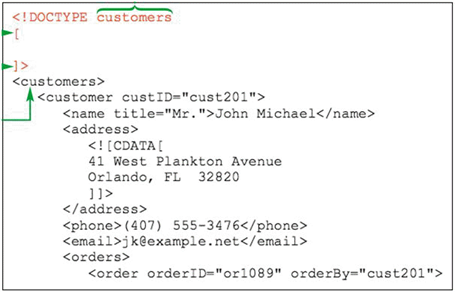Exam 2: Validating an Xml Document
Exam 1: Creating an Xml Document91 Questions
Exam 2: Validating an Xml Document91 Questions
Exam 3: Working With Basic Schemas91 Questions
Exam 4: Working With Advanced Schemas91 Questions
Exam 5: Working With Xslt and Xpath91 Questions
Exam 6: Working With Xslt Functional Programming91 Questions
Exam 7: Creating Element Groups91 Questions
Exam 8: Combining Xml and Php91 Questions
Exam 9: Working With Xml and Databases91 Questions
Select questions type
 The DOCTYPE declaration has to be added to a document epilog as shown in the accompanying figure.
The DOCTYPE declaration has to be added to a document epilog as shown in the accompanying figure.
(True/False)
4.9/5  (37)
(37)
To test for validity, an XML parser must be able to compare the XML document with the rules established in the DTD.
(True/False)
4.8/5  (41)
(41)
Attribute values do not allow you to control the format of the character data.
(True/False)
4.8/5  (38)
(38)
Attribute-list declarations can be located anywhere within the document type declaration.
(True/False)
4.8/5  (37)
(37)
Case 2-2
Rosalind wants to add attribute declarations to her DTD, and she turns to you for information about the possible attribute types.
-You help Rosalind write the declaration of an attribute named "credits" of an element named "course." This optional attribute should contain character data, and a value of 4 should be used if an attribute value is not specified. Which of the following is an appropriate declaration of this attribute?
(Multiple Choice)
4.8/5  (24)
(24)
One way to create a valid document is to design a(n) _____ for the document.
(Multiple Choice)
4.8/5  (38)
(38)
Case 2-2
Rosalind wants to add attribute declarations to her DTD, and she turns to you for information about the possible attribute types.
-You help Rosalind write the declaration of the "semester" attribute described in the previous problem. Which of the following is an appropriate declaration for this attribute?
(Multiple Choice)
4.9/5  (45)
(45)
The _____ content model is reserved for elements that store no content.
(Multiple Choice)
4.8/5  (34)
(34)
Any attribute that has been declared by the data type ID is a candidate for an ID _____.
(Multiple Choice)
4.8/5  (34)
(34)
An attribute declared as a(n) _____ token must have a value equal to the value of an ID attribute located somewhere in the same document.
(Short Answer)
4.8/5  (40)
(40)
_____ types are character strings that follow certain rules for format and content.
(Short Answer)
4.8/5  (33)
(33)
How many DOCTYPE declarations can there be in an XML document?
(Multiple Choice)
4.8/5  (41)
(41)
The _____ content model allows an element to store any type of content.
(Multiple Choice)
4.7/5  (33)
(33)
The _____ value for the content model in an element declaration means an element cannot store any content.
(Multiple Choice)
4.8/5  (37)
(37)
To test for validity, an XML parser must be able to compare your XML document with the _____ rules you set up in the DTD.
(Multiple Choice)
4.8/5  (31)
(31)
Generally, elements contain parsed character data or child elements.
(True/False)
4.8/5  (43)
(43)
The chunks into which a DTD can be broken with parameter entities are known as _____ .
(Multiple Choice)
4.9/5  (39)
(39)
A(n) _____ specifies an element's name and indicates what kind of content it can contain.
(Short Answer)
4.8/5  (39)
(39)
Showing 41 - 60 of 91
Filters
- Essay(0)
- Multiple Choice(0)
- Short Answer(0)
- True False(0)
- Matching(0)